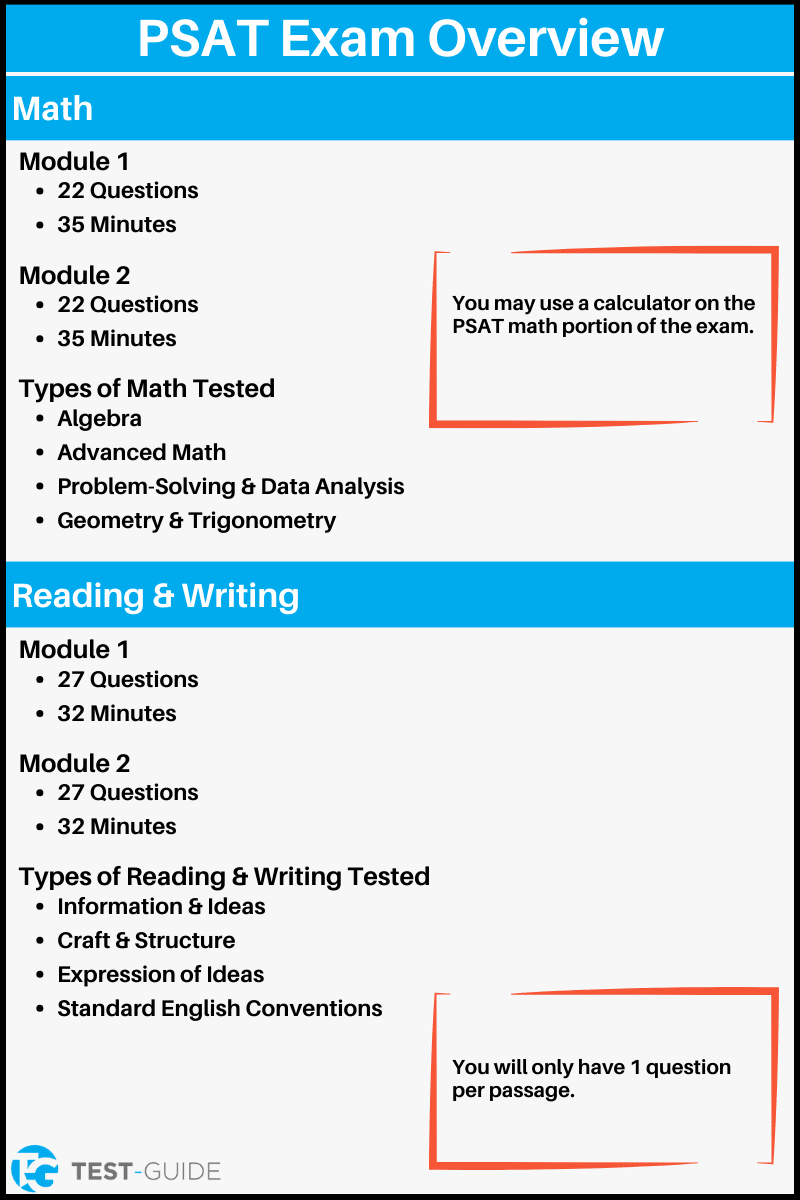The PSAT/NMSQT is an exam administered by the CollegeBoard that is used as practice for the SAT and to determine students who qualify for a National Merit Scholarship.
The PSAT has no bearing on the college admissions process and scores will not be sent to colleges. The exam is administered to thousands of high school students throughout the United States.
The PSAT/NMSQT has recently been switched to a digital format. The test format is now shorter, easier to take, and allows more time per question. We will highlight all those changes below.
You can prepare for the exam by using our PSAT practice exam.
What is on the PSAT?
The PSAT is made up of 2 sections. There is a reading and writing section and a math section. There are a total of 98 questions on the PSAT and you will have a total of 134 minutes to take the exam.
| Section | Number of Questions | Length (Minutes) |
|---|---|---|
| Reading and Writing Module 1 | 27 | 32 |
| Reading and Writing Module 2 | 27 | 32 |
| Math Module 1 | 22 | 35 |
| Math Module 2 | 22 | 35 |
| Total | 98 | 134 |

PSAT Reading and Writing Breakdown
You will be tested on 4 broad topics within the reading and writing section on the PSAT. Those 4 topics include:
- Craft and Structure
- Information and Ideas
- Standard English Conventions
- Expression of Ideas
Questions in this section will be multiple-choice. You will only have 1 question per passage. Some questions may include a graphic for you to interpret. Here is more information from CollegeBoard.
PSAT Math Breakdown
You will be tested on 4 broad topics within the math section on the PSAT. Those 4 topics include:
- Algebra
- Linear Equation in 1 Variables
- Linear Equations in 2 Variables
- Linear Functions
- Systems of 2 Linear Equations in 2 Variables
- Linear Inequalities in 1 or 2 Variables
- Advanced Math
- Equivalent Expressions
- Nonlinear Equations in 1 Variable
- Systems of Equations in 2 Variables
- Nonlinear Functions
- Problem-Solving and Data Analysis
- Ratios, Rates, and Proportional Units
- Percentages
- Distributions and Measures of Center and Speed
- Models and Scatterplots
- Probability and Conditional Probability
- Inferences from Sample Statistics and Margin of Error
- Observational Studies and Experiments
- Geometry and Trigonometry
- Area and Volume
- Lines, Angles, and Triangles
- Right Triangles and Trigonometry
- Circles
Most questions in this section will be multiple-choice. However, some questions will require you to write in the answer. You will be allowed to use a calculator. Here is more information from CollegeBoard.
PSAT Scoring
Your PSAT will be scored on a scale from 320-1520. You will see 3 total scores when you view your score report:
- Total Score
- Reading and Writing Section Score
- Math Section Score
Your total score is the sum of your 2 section scores (math and reading/writing). Both sections contribute equally to your total score.
Your scores will be sent to your high school, National Merit Scholarship Corporation, and other various scholarship/recognition programs.
Your scores will not be sent to colleges. They are not used as part of the college admissions process. You can read our in-depth guide to PSAT scores for more information.
When is the PSAT Administered?
The PSAT is typically administered your sophomore or junior year of high school. Schools will administer the PSAT on a school day from October 2 – October 31.
You do not have to register for the PSAT (no PSAT test dates). You school / school district will determine whether they want to offer it and when they want to offer it (between October 2 and October 31).
What is the Point of the SAT?
The PSAT/NMSQT serves 2 main purposes:
- To help prepare you for the SAT.
- To help you earn scholarship money.
The PSAT is very similar to the SAT and is a great way to gain some exposure to the style and format of the SAT. You will get an idea of where you stand and can use this experience to score better on the SAT.
If you score well enough on the PSAT, you can land a National Merit Scholarship. This scholarship can lead to some serious money for students to use towards their college education.
It is important to remember that this standardized exam has no bearing on your college application / admissions process. This is a relatively low stakes exam that can be used to help prepare for the SAT and, if you score well enough, the potential to earn some scholarship money.
How Do Scholarships and the PSAT Work?
If you score well enough, you may qualify for various scholarships. There are 3 categories of merit scholarships:
- National Merit Scholarships
- Corporate-Sponsored Merit and Special Scholarships
- Renewable College-Sponsored Merit Scholarships
The National Merit Scholarship is a $2,500 scholarship. The Corporate-Sponsored Scholarships vary in amount but can be as much as $10,000 per year. The Renewable College-Sponsored Scholarships can be as much as $2,000 per year.
How Can I Prepare for the PSAT?
As mentioned above, the PSAT is a relatively low-stakes exam. With that being said, scoring well on this exam can present you with some scholarship money options. One of the best ways to prepare is by answering PSAT practice questions.
Practice exams will help you become more familiar with the exam by exposing you to the types of questions, format of the exam, and becoming more comfortable with the timing aspect of the exam.
Frequently Asked Questions
What Does PSAT/NMSQT Stand For?
PSAT/NMSQT stands for Preliminary SAT/National Merit Scholarship Qualifying Test.
How many questions are on the PSAT?
There are a total of 98 questions on the PSAT.
How long is the PSAT?
The PSAT will last for a total of 134 minutes. Each module will have a set time limit.
Is the PSAT used by colleges?
The PSAT is not used by colleges during the college admissions process. Colleges will not even receive your scores.

